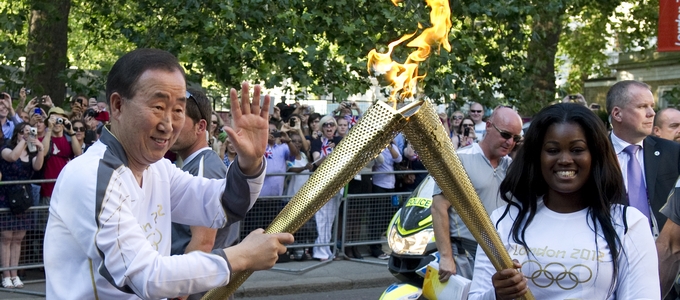Geneva, August 13, 2012: Flame, The London 2012 Olympic Games came to an end yesterday and are already widely lauded as an overall success, with plenty of historic moments that will stay fresh in the minds of many for years to come. But beyond the stadiums, courts and fields where sporting excellence prevailed, the event offered the opportunity to help advance the human development agenda.
UN Secretary-General Ban Ki-moon and his Special Adviser on Sport for Development and Peace, Mr. Wilfried Lemke, witnessed and participated in several events and meetings prior to the Games and throughout their time in London.
After the closing ceremony, Special Adviser Lemke said: “I wish to congratulate the organizers, athletes, spectators and even more so the many volunteers whose remarkable efforts and support have been exemplary from start to finish.”
He continued: “There were a number of notable occasions and initiatives before and during these 17 days of competition that contributed to the legacy that these Games will have in the long run. In particular, the inclusion of female athletes in all delegations, including Saudi Arabia, will help change mentalities and is a very encouraging step in the fight for gender equality and women’s empowerment in and through sport.”
Mr. Lemke also touched on his strong support of the seemingly large amount of reduced doping cases throughout these Games, as well as on the notions of dialogue and friendship materializing through the event.
“Even though a full observance of the Olympic Truce, meaning a cessation of hostilities during the Games, was not achieved, its spirit was definitely brought to life by a vast number of peace building and conflict prevention initiatives carried out worldwide, as well as by the exemplary behaviour shown by the athletes, spectators and volunteers,” Mr. Lemke declared.
On 17 October 2011 in New York, all 193 UN Member States had co-sponsored a General Assembly resolution calling for the observance of the Truce, a first in history.
Besides the Truce, the UN system took the opportunity to channel the energy and potential of the event in order to advance their objectives. Indeed, a number of UN agencies carried out specific projects, ranging from awareness-raising campaigns (e.g. UNODC, ILO, UNAIDS, WFP, UNESCO) to community programmes (UNICEF UK), equipment collection (UNHCR), disease surveillance and response (WHO) and environmental protection (UNEP).
Such projects have undoubtedly set the benchmark and will likely inspire future host cities like Sochi, Rio de Janeiro and PyeongChang. Passing the flame and sharing best practices will help ensure continued social impact of large-scale sporting events and will keep strengthening the importance of legacy aspects in staging such events.
Sport has the unique power to mobilize, attract and inspire. The London 2012 Olympic Games will hold strong in the memories of many for the innovative and conscious approach to human development that was prevalent throughout the early preparations of the Games, continuing with the lasting legacy beyond the closing ceremony and into the exciting start of the Paralympic Games on 29 August. —- UNOSDP/Image © UN Photo/Eskinder Debebe


Leave a Reply
You must be logged in to post a comment.